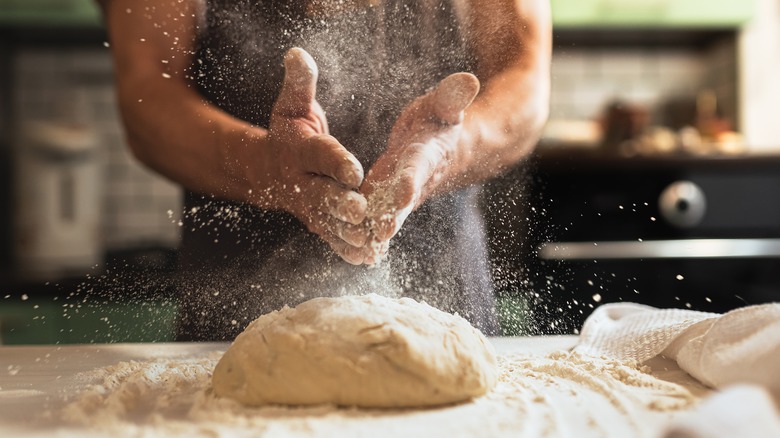The Future Of Pastry Chefs, Explained
As is the case with other businesses, there is a hierarchy in professional kitchens. Working under tight margins, restaurants often prioritize savory chefs over pastry chefs, designating more of the budget and kitchen space to those who prepare entrees, the part of the menu that generates the most money. Desserts and bread are often seen as expendable; bread can be outsourced when budget cuts are necessary, and desserts can be created by a savory chef winging Grandma's pie or a make-ahead dessert, like ice cream or creme brûlée.
Since baking is as much a science as an art, Johnson and Wales University in Rhode Island says pastry chefs must understand how to manipulate chemical reactions when developing a recipe, how to temper chocolate like a chocolatier, decorate cakes with precision, spin sugar into glass-like sculptures, and compose a plate to look as beautiful as it tastes. However, a few years after the recession of 2008, LA Weekly reported that such professionally made sweets, where "the beautiful architecture of the plated dessert is the flourish of the entire meal," may be endangered, rendering pastry chefs nonessential.
Restaurateurs are not the only ones placing pastry chefs at the bottom of the pecking order. Many diners consider dessert optional, not saving room or calories for sweets when eating out. Post-pandemic, as the world and businesses continue to return to "normal," we wonder what the pastry industry's future looks like.
Many bakers are leaving restaurants
Over the last decade, dessert trends have shifted from labor-intensive, meticulously plated options to simple, nostalgic comfort sweets. The New York Times reports that bakery items like pies and cakes, once only found in diners' rotating display cases, are now being recreated for high-end menus. These homey desserts are made on a larger scale, with a cost saving to restaurants that can get eight slices out of one pie, reducing the number of pastry chefs needed.
With fewer job opportunities at restaurants, pastry chefs are creating businesses from their homes, thanks to cottage food laws and social media. According to Food Safety News, state laws allow small businesses "to bake, cook, can, pickle, dry or candy certain low-risk foods for sale" from home kitchens, avoiding the strict regulations faced by larger food producers. While they vary from state to state, cottage laws provide new options for pastry chefs beyond the "restaurant-to-retail bakery model," as pastry chef Brett Boyer described his experience in Eater. After two years of using Instagram to market his farmers market bakery stand, Boyer was able to start running Desert Bread out of his house in 2020.
The Bureau of Labor Statistics estimates that pastry chefs will be in higher demand over the next eight years, with an 8% increase in job opportunities versus the national average of 5% for other jobs. Whether they'll take these positions or create their own remains to be seen.

